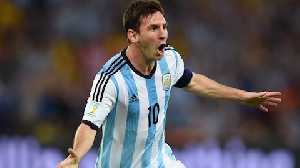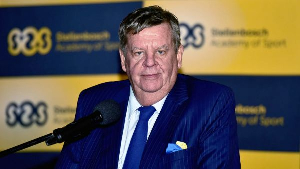When Philipp Lahm and his team-mates walk out onto the pitch at the Estadio do Maracana in Rio de Janeiro for the 2014 World Cup Final on Sunday, one of Germany's greatest footballing heroes, Horst Eckel, will be glued to his TV set and doubtless reminded of his own World Cup Final experience.
In 1954, he was the youngest player in the West German Miracle of Bern squad that defeated a practically unbeatable Hungary side 3-2 to give the German Football Association its very first World Cup crown.
60 years and nine days later, Eckel is now willing the current black, red and gold generation to make history once more in Brazil. “I believe the lads can do it. We’ve already got a slightly better chance. The team have got into a good rhythm,” the 82-year-old said when FIFA.com approached him for comment a few days before Sunday’s big game. He also warned: “It’s no coincidence that Argentina have reached the Final. They haven’t got a bad team either, and our boys will have to watch Lionel Messi for 90 minutes. You can't take your eyes off a player like that for a second.”
A remarkably poor start Eckel believes that Germany have a truly strong team without any real weaknesses, “much like us back in 1954.” That year, the omens before that final showdown with the Mighty Magyars were anything but positive. “It was difficult for us to travel to Switzerland back then, because in 1954 Germany was not recognised in political, economic or sporting terms,” the former Kaiserslautern midfielder recalled to FIFA.com. “But we didn’t go there and just try not to lose; we wanted to play well and play for Germany.”
National coach Josef Herberger’s team progressed to the quarter-finals after two wins over Turkey and a bitter 8-3 thrashing by Hungary in the group stage. A 2-0 victory over Yugoslavia in the last eight was a breakthrough moment for the West German side. “After that, we realised that we could go far, but the prospect of becoming world champions was still a long way off,” Eckel explained. “At that point in time, reaching the semi-finals was an incredible achievement for us.” A brilliant 6-1 triumph over Austria followed.
The Final itself got off to an inauspicious start as Die Mannschaft conceded two early goals. “After that, a jolt went through the team. It came from [goalkeeper] Toni Turek right through to our strikers, saying: ‘Come on lads, we can’t lose that badly again.’ When we scored to make it 2-1, we realised that we had a chance even against this formidable Hungary team. For me, the 2-2 equaliser was the most important goal of all. We went in level at half-time and said to ourselves: ‘We’ve turned around a 2-0 deficit against Hungary, now we can become world champions too – and we want to be world champions!”
‘Hoch auf dem gelben Wagen’ The rest of the story is well-known. Helmut Rahn scored in the 84th minute to make it 3-2 and give Germany their first World Cup title – and the Miracle of Bern was born. “Of course, we were overjoyed and embraced each other, but we didn’t take our shirts off and throw them into the crowd or spray each other with beer like you see today – it just didn’t happen in our day,” the retired teacher said. “Then we went into the dressing room and sat down as if we’d lost the match. Every single one of us sat there and thought: ‘Are we really world champions? What will happen when we go home?’ At that point, Herberger brought us to our senses, saying: ‘What’s wrong with you all? Don’t you realise you’ve won the World Cup? Let’s sing.’ We always sang the folk song ‘Hoch auf dem gelben Wagen’ [‘High up on the yellow wagon’] with Herberger. After that we were fine, and then we got louder and carried on singing. It was like a dream.”
Despite eventually realising the scale of their achievement, the entire team was still overwhelmed by the reception they received on their triumphant return, as they were greeted and cheered by hundreds of thousands of jubilant people across the country. “As we weren’t recognised by the rest of the world, we didn’t realise what the mood was like in Germany,” said Eckel. “We only realised when we got back. That’s when we knew we’d done something small to help Germany get back on its feet. We were very proud of that.”
How does your life change when you become a world champion? “We probably wouldn’t be having this interview now if I hadn’t won the World Cup,” Eckel says to FIFA.com with a smile. He and Hans Schafer are now the only two surviving members of the team of 1954. “If it weren’t for that win, I’d just be one of a huge number of former footballers. It’s a great honour to be a world champion, but you shouldn’t get carried away afterwards; you’ve got to keep your feet on the ground. But the pride of winning a title like that never goes away.”
Eckel now believes that Joachim Low’s team are capable of experiencing that same feeling of pride. “We have a very good team, just like back in 1954,” the 82-year-old said. “We’re strong in both attack and defence. I can only say good things about this side, and I hope that they’ll play better than ever on Sunday because it’s the Final.”
Sports News of Friday, 11 July 2014
Source: fifa.com













